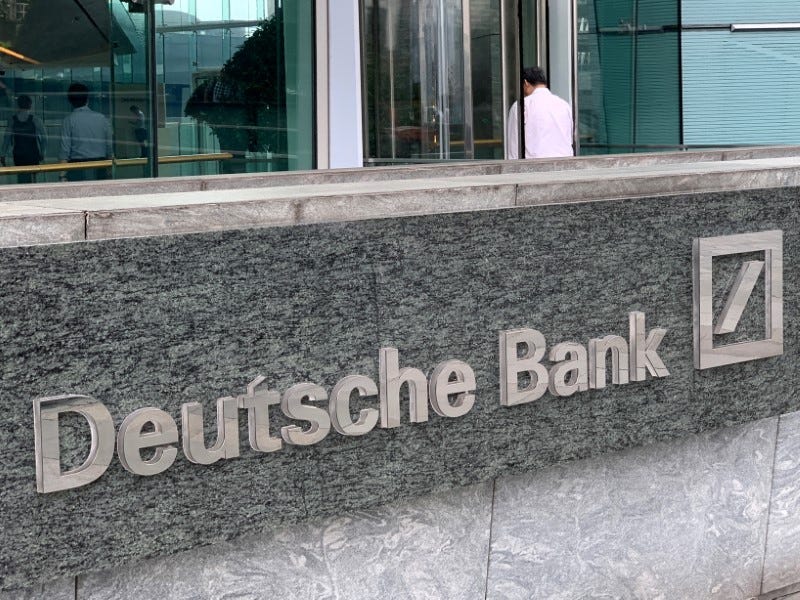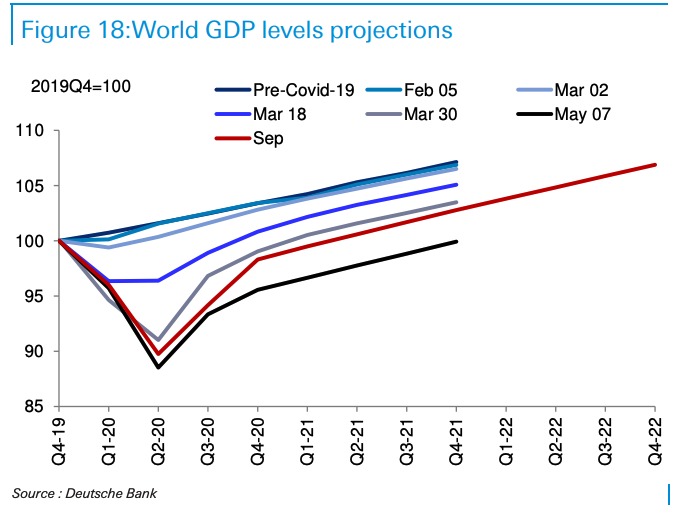
Reuters
- Deutsche Bank raises global GDP estimate with prediction that economic output will return to pre-virus levels by the middle of 2021, global head of economic research, Peter Hooper, said in a note on Monday.
- Greater monetary and fiscal stimulus packages in the US and Europe combined with Asia’s success in implementing preventative measures early to slow the spread of COVID-19 has contributed to the positive outlook.
- Despite positive GDP estimates for mid-2021, lasting effects of pandemic on unemployment and consumer behavior as well as “an increasing risk of financial disruption down the road” will impact original GDP estimates set before the pandemic.
- Visit Business Insider’s homepage for more stories.
Global economic growth is on track to return to pre-virus levels by the middle of next year, according to a note on Monday by Deutsche Bank’s global head of economic research, Peter Hooper.
Currently the growth rate is almost half-way back to reaching pre-virus levels, Hooper said.
“Global economic recovery from the depths of the Covid-19 plunge this past winter and spring has proceeded significantly faster than we envisioned in the gloomy days of early May when we last updated our overall world outlook,” Hooper said.
Deutsche Bank originally estimated in May that global gross domestic product would shrink 5.9% in 2020. The bank has now upgraded this estimate to a contraction of 3.9% for the year.
The bank also upgraded its forecast for global GDP in 2021, which it now expects to see increase by 5.6%, up from its estimate back in May for a rise of 5.3%. The International Monetary Fund in June published that it expected 5.4% growth in 2021.

Deutsche Bank
The improved forecast comes from an anticipation for stronger economic recovery over the second and third quarters of the year, driven by supportive fiscal and monetary policies in the US and Europe, together with measures that have helped slow the spread of COVID-19 in the Asia region, Hooper said.
The optimistic outlook on vaccinations has also played a role in Deutsche's GDP upgrade. Hooper said there were more than 170 vaccine candidates in development today, with nine vaccines currently in phase three trials. The bank has an expectation that "widespread vaccinations will begin by next summer."
Despite the positive recovery in the spring and the summer, Hooper expects the pace to slow, as the northern hemisphere moves into the colder months, combined with the likelihood that fresh US fiscal support will not be forthcoming until after the election in November.
Even as global GDP reaches pre-virus levels, Hooper said there will still be lasting effects on GDP from consumer behavior and the labor market, such as a greater prevalence of online shopping, the impact of working from home and reduced demand for travel and restaurant services. These effects will likely impact a "full recovery of economic activity to levels envisioned prior to COVID-19."
There is also an increasing chance of "financial disruption down the road", Hooper said, which could stem from growing overvaluation of assets and mounting debt levels from monetary and fiscal stimulus packages and could impact GDP. He also said that policy will inevitably have to tighten following the period of easing seen amid the pandemic.

